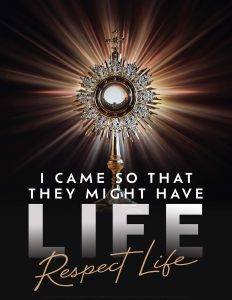Dear Friends,
“I came so that they might have life, (Jn 10:10).”
Since 1972, the year before abortion was legalized in the United States, the Catholic Church has dedicated the month of October as a special season to promote a culture of life throughout our land. This year’s theme is taken from Saint John’s gospel discourse on the Good Shepherd.

This venerable image of the People of God as God’s flock and Jesus as our Shepherd is significant for several reasons. First, the image of Jesus as our Shepherd is both consoling and hopeful as we reflect upon the selfless care and guidance of God who walks with us in this journey of life. Second, it’s context in John’s gospel reminds us of the challenges that we confront as followers of Christ.
In this portion of the gospel, Jesus more precisely refers to himself as the gate for the sheep, the one who gives access to God, the source of all life. Today in our world, however, many sadly seek to redirect the values we hold as Christians. Quite intentionally, they attempt to convince us of the significance of determining our own way while simultaneously setting aside the recognition of the unique and treasured status of all forms of human life. Espousing a flawed notion of freedom, their goal is to diminish appreciation for the ultimate values of the gospel, thereby undermining our conviction as Christians that Jesus alone guides God’s flock to life and salvation.
Despite the overturning of Roe v. Wade in 2022, the challenge to protect human life has not diminished at all. It’s merely shifted from being a national issue to a state issue. Threats to human life are increasingly evident in our world today; threats that we often fail – or refuse – to recognize. And make no mistake about it, with the efforts of so many influential groups and organizations in our land that seek to undermine the value of human life while masquerading as supporters of freedom and champions of justice, we are on the precipice of a slippery slope that will eventually lead to even more heinous actions that disregard the sanctity of life. It should come as no surprise that in addition to the tragic and continued widespread scourge of abortion, we’re also confronted with proposals and policies that favor assisted suicide, euthanasia, infanticide and human cloning. These too are dire threats to our belief in the dignity and value of the human person – as are the death penalty, human trafficking, and unjust immigration laws.
The good news, however, is that the voices of faithful, selfless disciples of Jesus and countless others from different faith traditions continue to be heard in our world, proclaiming the value of human life as the treasured gift of God that it is.
Pope Francis has often reminded us that “every person – from the most vulnerable unborn child to the sick, the elderly and the poor – has an inviolable right to life” and “is a masterpiece of God’s creation, made in his own image, destined to live forever, and deserving of the utmost reverence and respect.”
Though well beyond our ability to determine or control, life – from the moment of conception to natural end – is a gift to treasure and respect. We do so, however, not through our self-righteous criticisms of those whose beliefs may appear to be different than our own. … We treasure and respect life when we are courageous enough to assert our commitment to such values, despite how some may regard us in the process. … We treasure and respect life when we vote carefully and thoughtfully according to the beliefs that we treasure within our hearts. … And we most effectively witness to life when we are humble enough to embrace the gospel message of Jesus and to treat the lives that come into our own with reverence and dignity as children of one and the same God.
Therein lies the essence of Jesus’ words, “I came so that they might have life, (Jn 10:10).”
Faithfully yours in Christ,
Most Rev. Joseph C. Bambera, D.D., J.C.L.
Bishop of Scranton
